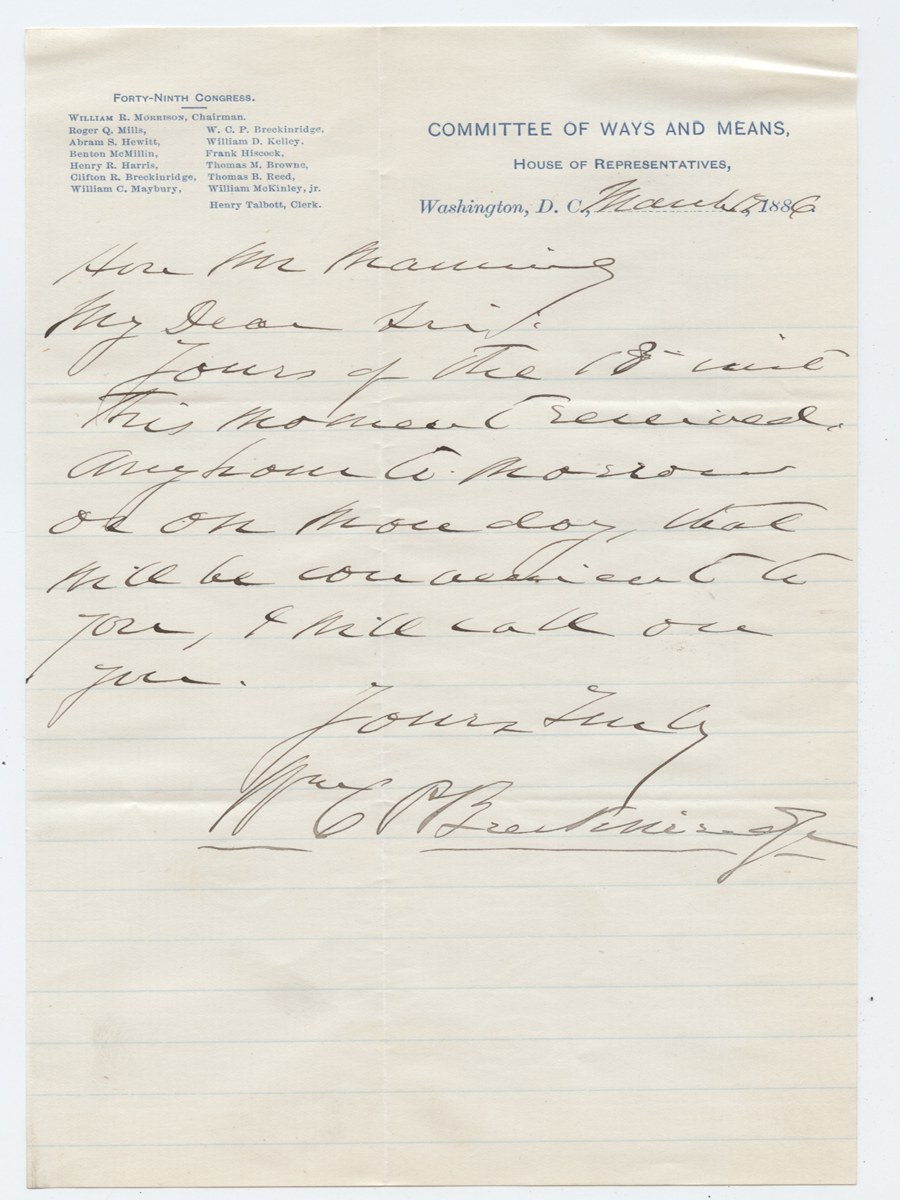

Breckinridge, William C. P. (1837 - 1904); William Breckinridge was the son of Robert Jefferson Breckinridge, a prominent Kentucky minister, educator, and Unionist politician. His mother was the former Ann Sophronisba Preston. He was born in Baltimore, Maryland. He was largely raised in Pennsylvania where his father was president of Jefferson College. Breckinridge graduated from Centre College in Danville, Kentucky in 1855. He then studied to be a medical doctor for a year but then switched to studying law. He earned his Juris Doctor from the University of Louisville in 1857. He returned to Lexington, Kentucky to engage in the practice of law. In this time he married Lucretia Clay a granddaughter of Henry Clay. She died in 1860. Despite his father's Unionist position (the elder Breckinridge supported the election of Lincoln), William entered the Confederate States Army in 1861, and was commissioned a Captain. He served in the cavalry under John Hunt Morgan. By the end of the war, he was Colonel of the 9th Kentucky Cavalry. He also served as a bodyguard to Jefferson Davis during his flight from Richmond. Following the war, he returned to Lexington, Kentucky where he resumed the practice of law and taught jurisprudence at the University of Kentucky. In 1866-1868, he was editor of the Lexington Observer and Reporter.[1] In 1869 Breckinridge ran unsuccessfully for county attorney losing in large part because he was in favor of allowing African-Americans to testify in the courts.[2] In 1884, he was elected to the United States House of Representatives as a Democrat. He was re-elected four times, serving from 1885 to 1895 (the 49th Congress through the 53rd Congress).[1] He had in later years married Issa Desha. After her death in 1892, he married Louse Wing. In 1890, he became a charter member of the District of Columbia Society of the Sons of the American Revolution. He was a Mason, and a member of the Masonic Knights Templar. In 1893, Madeleine V. Pollard filed suit against Breckinridge for breach of promise for his failure to marry her as promised.[3] The trial was a national sensation; the revelations of Breckinridge's infidelity and his weak defense of the breach of promise charge led to the loss of the lawsuit and contributed to the end of his political career.[4][5] In 1896, he ran for congress on a strong currency fusion ticket but was defeated. After this, he was hired by the Lexington Morning Herald as their chief editorial writer. At the November 1901 Convention of the State Federation of Labor in Lexington, Breckinridge delivered an eloquent speech in which he extolled the virtues of a six-day work week, opposed violent strikes, and encouraged negotiations. The following day, the vice president of the group, James D. Wood, took over the convention and helped pass resolutions which called Breckinridge an "enemy of the trade and labor organizations of the state." The controversy which followed split the federation's membership. 8 3/4" x 5 3/8" ALS. $150.00